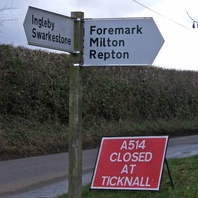
Viking Names
Foremark
Foremark, in the Repton and Gresley Hundred of Derbyshire, is a Scandinavian compound formed from the Old Norse elements forn ‘old’ and verk ‘work’. Thus, ‘old fortification’. The element verk undoubtedly was used in the Danelaw to describe a military or defensive structure; however, the element does not appear to be found in Scandinavian place-names. The place-name corresponds to the Old English place-name type Aldwark ‘old fortification’. One Aldwark is located in the Wirksworth Hundred of Derbyshire, and is situated near The Street, a Roman road, and Portway. Similarly a short distance east of Wall Hill and Foremark are raised earth formations, which perhaps could be the site of the original fortification. Furthermore, Foremark is very close to a known Great Heathen Army winter camp at Repton. Recent work by Dr Catrine Jarman has raised the possibility that Foremark is somehow related to that site, as outlined in a 2019 television programme, Britain’s Viking Graveyard.
Read More
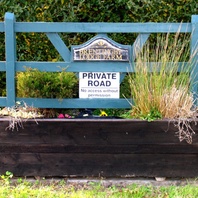
Viking Names
Brentingby
Brentingby, in the Framland Hundred of Leicestershire, is a difficult place-name that presents several problems. It is potentially an Anglo-Scandinavian hybrid from the Old English male personal name Branting or Brenting combined with Old Norse by ‘a farmland, a village’. Alternatively the name could be ‘the by of Brant’s people’ with the Old English –ingas ‘people of’ place-name forming element. However, an Old English folk-name combined with Old Norse by is unusual. Another suggestion is that an early Old English place-name Branting/Brenting, from Old English brant ‘steep’ and the place-name forming suffix –ing, was later compounded with Old Norse by thus ‘the farmstead, village at Branting (‘the steep place’)’. Brentingby stands on a steep slope above the flood-plain of the River Eye.
Read More
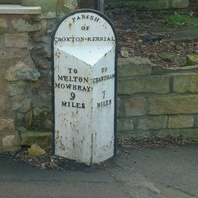
Viking Names
Croxton Kerrial
The first element of Croxton Kerrial, in the Framland Hundred of Leicestershire, likely comes from the Old Danish male personal name Krōk (Old Norse Krókr), originally a byname meaning ‘crooked-back’, possibly ‘crooked-dealer’ related to Old Norse krókr ‘hook’. Alternatively the first element could be Old English crōc ‘a crook’, which relates to a location situated in a nook or bend of land. The second element is Old English tun ‘an enclosure; a farmstead; a village; an estate’. The land was granted to granted to Bertramus de Cryoll in 1239 thus the affix Kerrial. This name can be compared to South Croxton also in Leicestershire.
Read More
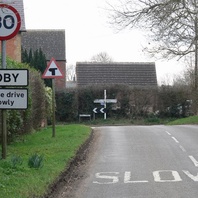
Viking Names
Hoby
Hoby, in the East Goscote Hundred of Leicestershire, is an Anglo-Scandinavian hybrid name from Old English hoh ‘a heel; a sharply projecting piece of ground’ and Old Norse by ‘A farmstead, a village’. The name is topographically appropriate because the present village sits at the foot of a great spur of land which abuts the River Wreake. Hoby is now a joint parish with Rotherby.
Read More
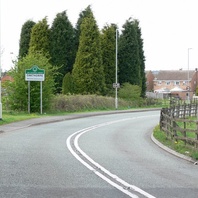
Viking Names
Oakthorpe
Oakthorpe, historically belonging to the Repton and Gresley Hundred of Derbyshire, probably comes from the Old Norse male personal name Áki (genitive singular Áka) and the Old Norse element þorp ‘outlying farm, settlement’. Alternatively the first element of the place-name could be Old English ac ‘oak tree’; however, it is more likely that the Old Norse personal name became confused with this Old English appellative. Oakthorpe is a joint parish with Donisthorpe and they were both transferred to Leicestershire in 1897.
Read More
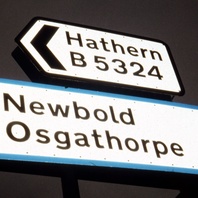
Viking Names
Osgathorpe
Osgathorpe, in the West Goscote Hundred of Leicestershire, comes from the Old Danish male personal name Asgot (Old Norse Ásgautr) and the Old Norse element þorp ‘outlying farm, settlement’. Some later forms of the name show replacement by the Norman male personal name Angod. In the neighbouring Thringstone in Coalville parish, the field-names Ossegodishaug and Hosgothawe (with Old English haga or Old Norse hagi ‘enclosure’) presumably record the same owner of land.
Read More

Viking Names
Snibston
Snibston, in the West Goscote Hundred of Leicestershire, is a hybrid place-name formed from the Old Norse male personal name Snípr, a byname related to Norwegian snipa ‘a miser, an unsociable person’ and Old English tun ‘farm, settlement’. Snibston became a joint parish with Ravenstone in 1884 when Ravenstone moved from Derbyshire to Leicestershire.
Read More
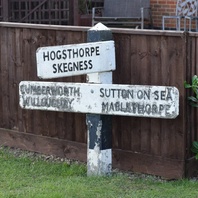
Viking Names
Cumberworth
Cumberworth, in the Calceworth Wapentake of Lincolnshire, probably comes from the Old English male personal name Cumbra and the Old English element worth ‘enclosure’. It has also been suggested that the first element is an Old English ethnonym Cumbre ‘the Cymry, the Welsh, the Cumbrian Britons’. However, the exact implications of such a name are not yet fully understood and are the subject of ongoing work by Dr Jayne Carroll of the Institute for Name-Studies, University of Nottingham.
Read More
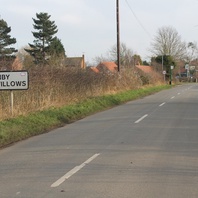
Viking Names
Barnby in the Willows
Barnby in the Willows, in the Newark Wapentake of Nottinghamshire, most likely comes from the Old Norse elements barn ‘child’ and by ‘farm, settlement’. Its meaning, ‘farmstead of the children’, may indicate joint inheritance by the offspring. Alternatively, the first element of the name could come from the Old Danish male personal name Barni. The affix is added at a later date and means ‘among the willow-trees’ and could be connected to its low location by the river Witham. The place-name has the same etymology as Barnby Moor, in the Bassetlaw Wapentake of Nottinghamshire.
Read More
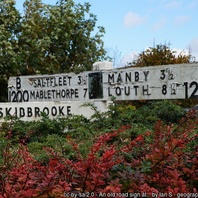
Viking Names
Saltfleetby
Saltfleetby, in the Louth Eske Wapentake of Lincolnshire, comes from the stream-name Saltfleet (Old English salt and flēot) and the Old Norse element by ‘farm, settlement’, referring to the latter’s location. There are actually three Saltfleetbys, now identified by the dedications of their parish churches, Saltfleetby All Saints, Saltfleetby St Clement, and Saltfleetby St Peter.
Read More

Viking Names
Roston
Roston, in the Appletree Hundred of Derbyshire, comes from the Old Norse male personal name Hrosskell and the Old English element tun ‘farm, settlement’. It is thus a hybrid name. Roston is a joint parish with Norbury.
